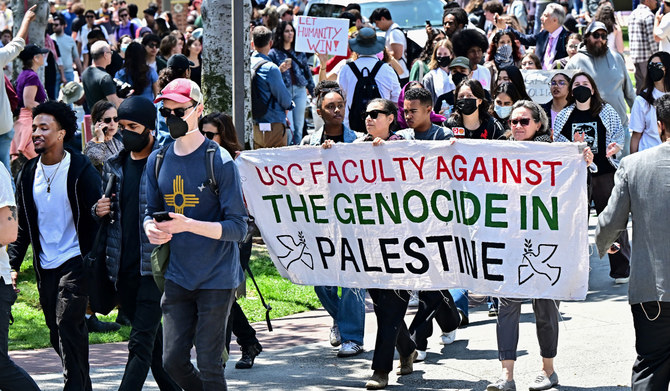WASHINGTON: Students protesting the war in Gaza abandoned their camp at the University of Southern California early Sunday after being surrounded by police and threatened with arrest, while Northeastern University’s commencement began peacefully at Boston’s Fenway Park.
Developments in both places were being watched closely following scores of arrests last month — 94 people at USC in Los Angeles and about 100 at Northeastern in Boston.
Dozens of Los Angeles Police Department officers arrived about 4 a.m. at USC to assist campus safety officers. The university had warned of arrests on social media and in person. Video showed some protesters packing up and leaving, while officers formed lines to push others away from the camp as it emptied out. The university said there were no reports of any arrests.
USC President Carol Folt said it was time to draw a line because “the occupation was spiraling in a dangerous direction” with areas of campus blocked and people being harassed.
“The operation was peaceful,” Folt wrote in an update. “Campus is opening, students are returning to prepare for finals, and commencement set-up is in full swing.”
USC earlier canceled its main graduation ceremony while allowing other commencement activities to continue.
At the Northeastern commencement Sunday, some students waved small Palestinian and Israeli flags, but were outnumbered by those waving the flags of India and the US, among others. Undergraduate student speaker Rebecca Bamidele drew brief cheers when she called for peace in Gaza.
The Associated Press has tallied about 2,500 people arrested at about 50 campuses since April 18, based on its reporting and statements from universities and law enforcement.
Arrests continued apace over the weekend. At the University of Virginia, there were 25 arrests Saturday for trespassing after police clashed with protesters who refused to remove tents. At the Art Institute of Chicago campus, police cleared a pro-Palestinian encampment hours after it was set up Saturday and arrested 68 people, saying they would be charged with criminal trespass.
ARRESTS IN VIRGINIA
In Charlottesville, Virginia, student demonstrators began their protest on a lawn outside the school chapel Tuesday. Video on Saturday showed police in riot gear and holding shields lined up on campus, while protesters chanted “Free Palestine.”
As police moved in, students were pushed to the ground, pulled by their arms and sprayed with a chemical irritant, Laura Goldblatt, an assistant professor who has been helping the demonstrators, told The Washington Post. The university said protesters were told that tents were banned under school policy and were asked to remove them.
Virginia Attorney General Jason Miyares told Fox News on Sunday the police response was justified because students had been warned repeatedly to leave, were violating the school’s conduct code, and that outsiders who were not students provided protesters with supplies like wooden barriers.
“We’ve seen folks that are not students show up in riot gear with bull horns to direct the protesters on how to flank our officers,” Miyares said.
He said some had put bear spray into water bottles and thrown them at officers.
It was the latest clash in weeks of protests and tension at US colleges and universities.
Tent encampments of protesters urging universities to stop doing business with Israel or companies they say support the war in Gaza have spread in a student movement unlike any other this century. Some schools reached agreements with protesters to end the demonstrations and reduce the possibility of disrupting final exams and commencements.
DEMONSTRATIONS AMID COMMENCEMENT
The University of Michigan was among the schools bracing for protests during commencement this weekend, as were Indiana University, Ohio State University and Northeastern. More ceremonies are planned in the coming weeks.
In Ann Arbor, there was a protest at the beginning of the event at Michigan Stadium. About 75 people, many wearing traditional Arabic kaffiyehs along with their graduation caps, marched up the main aisle toward the stage.
They chanted “Regents, regents, you can’t hide! You are funding genocide!” while holding signs, including one that read: “No universities left in Gaza.”
Overhead, planes pulled banners with competing messages. “Divest from Israel now! Free Palestine!” and “We stand with Israel. Jewish lives matter.”
Officials said no one was arrested, and the protest didn’t seriously interrupt the nearly two-hour event, attended by tens of thousands of people, some of them waving Israeli flags.
OTHER PROTESTS CONTINUE
At Indiana University, protesters urged supporters to wear their kaffiyehs and walk out during remarks by school President Pamela Whitten on Saturday evening. The Bloomington campus designated a protest zone outside Memorial Stadium, where the ceremony was held.
At Princeton University in New Jersey, 18 students began a hunger strike to try to push the university to divest from companies tied to Israel. Students at other colleges, including Brown and Yale, launched similar hunger strikes this year before the more recent wave of demonstrations.
The protests stem from the conflict that started Oct. 7 when Hamas militants attacked southern Israel, killing about 1,200 people, mostly civilians, and taking roughly 250 hostages. Vowing to destroy Hamas, Israel launched an offensive in Gaza that has killed more than 34,500 Palestinians, about two-thirds of them women and children, according to the Health Ministry in the Hamas-ruled territory. Israeli strikes have devastated the enclave and displaced most of its inhabitants.
Anti-war protesters leave USC after police arrive, while Northeastern ceremony proceeds calmly
https://arab.news/juv9w
Anti-war protesters leave USC after police arrive, while Northeastern ceremony proceeds calmly

- Israel has killed more than 34,000 Palestinians, according to Gaza’s Health Ministry
Russia diverts its naphtha from Oman due to Middle Eastern crisis, data shows

- Strikes have disrupted energy production and shipping, including naphtha loadings and discharges
- Since the European Union’s full embargo on Russian oil products took effect in February 2023, most Russian naphtha has been directed to the Middle East and Asia
MOSCOW: Russia has diverted its naphtha cargoes from Oman amid the Middle East crisis as it looks for new buyers, traders said and LSEG data showed, with at least one tanker now heading for Singapore.
Iran’s strikes on Gulf countries in retaliation for Israeli and US strikes against it have disrupted energy production and shipping, including naphtha loadings and discharges.
Since the European Union’s full embargo on Russian oil products took effect in February 2023, most Russian naphtha has been directed to the Middle East and Asia.
Middle Eastern countries are also the top supplier to Asia with the recent disruption forcing Asia’s naphtha margin to four-year highs, while at least one South Korean naphtha cracker operator was considering declaring force majeure and another has cut its operating rate by around a fifth.
The Liberia-flagged tanker, Amfitrion, which loaded in February in the Russian Black Sea port of Novorossiysk destined for Oman, last week halted navigation near the Gulf of Masira and on Tuesday turned for Singapore, according to LSEG data.
Five middle-sized tankers carrying a total 180,000 metric tons of naphtha in January departed Russian ports for an offshore STS (ship-to-ship) berth near Oman’s Shinas, shipping data showed. The final destination of these cargoes remains unknown.
According to data from LSEG and traders, Russia also sent two cargoes to Oman’s Sohar in November-December, carrying a total of 190,000 tons of naphtha as its other markets dried up.
India and Taiwan were among the main Asian buyers of Russian naphtha, but recent US sanctions have prompted both countries to pull back. Exports to Venezuela have also fallen to zero this year after US President Donald Trump in December ordered a blockade on all sanctioned oil tankers entering or leaving the Latin American country.
Though Asian buyers face naphtha shortages, Western sanctions could force traders to shun Russian cargoes. The long navigation from Russia’s Baltic ports to Asia also prevents prompt shipments, market sources said.














